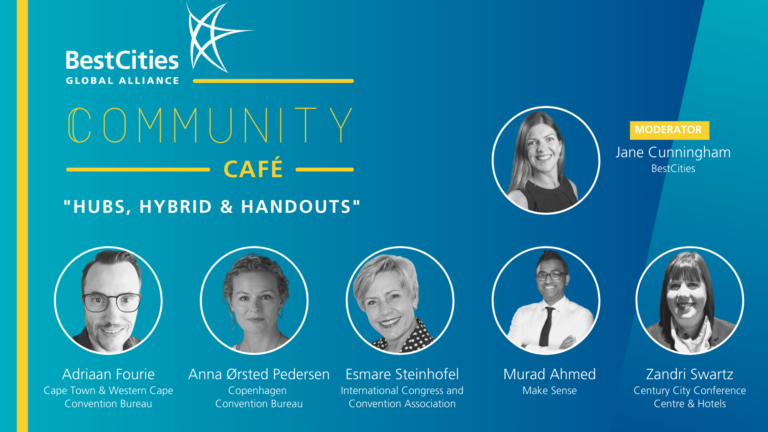History in the making: the rise of hybrid events
At the beginning of the pandemic, virtual events rapidly became the new normal. Across industries, businesses and individuals suddenly had to tune into Zoom meetings, navigate virtual event platforms like EventsAIR and battle lax internet connections.
Now, as the world starts to open up and people venture back into the office, it’s time to pivot once again – this time towards hybrid events. Because, while virtual events were the only option when the world was in lockdown, they reinforced the importance of meeting in person – the nuances and niceties we took for granted, like brainstorming with our peers, feeding off the energy of a real-life audience, and exploring the host destination.
BestCities’ multi-hybrid Community Café asked industry leaders in Cape Town and Copenhagen to share their thoughts on the future of hybrid events, and also provide tips on hosting them successfully.
In Cape Town, the panel included:

Regional director (Africa) International Congress and Convention Association (ICCA)

Brand Influencer, Century City Conference Centre
In Copenhagen, speakers were:

Senior Bid Manager, Copenhagen Convention Bureau

CEO/Executive Producer, Make Sense
A whole new world: considerations for hybrid events
In 2020, ICCA was forced to reconsider its global Annual Congress – but instead of cancelling, the organization decided to hold the Congress as a hybrid event in eight hubs around the world. In Africa, the bid to host was awarded to Cape Town & Western Cape Convention Bureau, with Century City Conference Centre named the official hotel.
“Close to the beginning of the pandemic, we realized we could provide event planners with tools that made it easier for them to host virtual and hybrid conferences,” said Zandri Swartz, the hotel’s brand influencer. “We offered these to ICCA for the Annual Congress, and also created a green screen studio for the virtual component. It was definitely a learning curve – we were having conversations about camera angles and shot lists, where normally we would discuss catering and décor.”

And then there are budget considerations. For hybrid events, associations not only pay for the venue and related costs like catering, sanitization/cleaning and AV, but also need to invest in high-speed internet, virtual event software, and a professional production team.
Understanding these considerations early on, Swartz and her team familiarized themselves with different platform capabilities, AV options and suppliers, and swiftly became a go-to resource for clients seeking cost-effective hybrid event solutions.
It’s also important to note that different parts of the world have varying relationships with, and access to, the technology required to host a successful hybrid or virtual event. Therefore, associations – particularly those that wish to reach delegates from developing countries – need to consider who is organizing the event, what technology will be required, and whether delegates will need additional support or access.
The non-negotiables: selecting a hybrid event venue
When selecting a venue to host the live component of a hybrid event, Swartz outlines three main considerations for planners:
COVID-19 compliance
Event venues should offer proof of staff vaccination, and have stringent health and safety regulations in place.
Flexibility
Delegate numbers and event space can change on a dime in a pandemic era, as can government regulations. Venues need to be flexible to stand out from competitors – for example, by quickly shifting to a fully virtual event without penalizing the client.
Speedy Wifi
Reliable internet connection is a must for hybrid events.
“Pre-2020, events were much more controllable than they are now. With everything now happening on a laptop screen, we’re effectively producing a TV show,” said Swartz. “We rely on virtual delegates’ and speakers’ bandwidth and connection to keep the event going, so these should be primary considerations for planners going forward.”
That said, here are a few tips from the hotel’s AV team:
Invest in a great graphic designer
Hybrid events rely on attention-grabbing digital invitations, social media and conference websites to capture and keep the attention of potential and confirmed attendees. Hire a pro graphic designer to ensure there’s plenty of content to play with.
Find a savvy technical team
The average AV guy won’t cut it for a hybrid event, particularly one that crosses multiple time zones. Technical support needs to be available 24/7 for a virtual event, and onsite during the live component to ensure audiences are connected and aligned.
Prepare the speakers
Presenting to a camera and speaking in front of a live audience are entirely different beasts. Event planners need to remember that speakers aren’t trained actors, so they should be encouraged to practice and become comfortable with their required mode of presentation.
Why bother? The case for hybrid events
At this point, hybrid events might sound like more trouble than they’re worth – but the extra planning required can pay off in spades. Take it from MakeSense, a video production company based in Copenhagen that’s become a leader in executing seamless hybrid events.
“We started designing hybrid events a long time ago, when there were no blueprints,” said Murad Ahmed, the company’s CEO/executive producer. “In Copenhagen, where there are no longer restrictions, we have a unique ability to experiment with this new landscape and become a model for other destinations in terms of how it can unfold.”

Murad Ahmed
CEO/Executive Producer
Make Sense
Ahmed shares the reasons he’s a longstanding champion for hybrid events:
Expanded reach
Many delegates who are uncertain about travel, or facing travel restrictions in their region, might not be in a position to attend in-person events. Hybrid offerings ensure they can continue to take part, long after the pandemic is over.
Hybrid events can be promoted much earlier than in-person events – and marketing doesn’t have to end when the conferences does. Indeed, associations can continue producing content throughout the year – or reshare conference sessions at a later date – as well as provide insights from past events and embed learnings into future marketing.
Maintaining the destination connection
Many host destinations are concerned that virtual attendees lose out on the experience of exploring in person. However, there are several ways to restore the destination connection during hybrid events:
While live attendees are treated to a gala dinner and entertainment, virtual delegates can be offered a behind-the-scenes element – for example, seeing the entertainer prepare before the show, or having a Q&A with the venue’s executive chef. This exclusive access can keep virtual delegates engaged, particularly when they’re offered an experience designed solely for them.
Social elements, such as wine sampling or chocolate tasting, can be hosted onsite, while virtual attendees are sent the ingredients to their home or office. Then, a live guided tasting is live-streamed to virtual delegates, so everyone can enjoy the experience together.
“We receive a lot of questions from planners asking questions like, ‘Does Copenhagen has any hybrid-friendly venues?’. That’s a hard question to answer when we aren’t provided further details, so there’s clearly a lot of clarification required for industry about the dialogue and language around hybrid events,” said Anna Ørsted Pedersen. “That’s why Copenhagen Convention Bureau designed a toolkit for hybrid meetings, to provide planners with some education around requirements and considerations, as well as offer solutions.”

While the global meetings industry continues to find its footing after the global pandemic, hybrid events are emerging as the best of both worlds – a way to engage physical and virtual attendees, while promoting increased attendance and helping the meetings industry get back to business.
